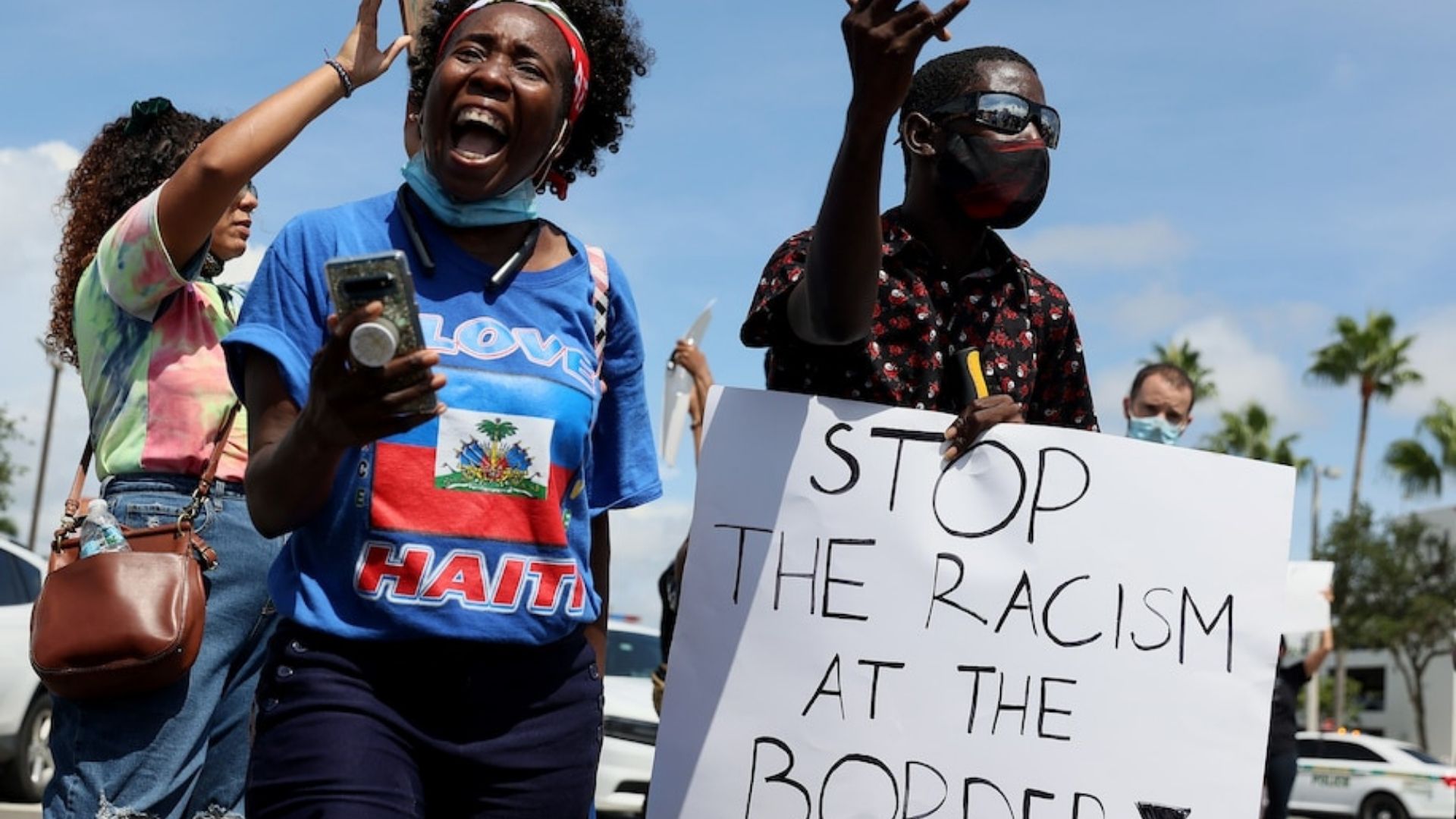I was haunted not only by the shock of the images of Haitian refugees on our borders; I remain haunted by their familiarity. Armed officers on horseback, using reins like whips, as Black people and their children run for safety. How many times has our nation corralled Black people like animals? We have seen images of lynchings, and sneers, and beatings, and firehoses for centuries—from the era of chattel slavery to Jim Crow to mass incarceration. How are we to reflect on what we most recently saw on the Texas border?
We have long extended cruelty to Black immigrants, Haitians in particular. I will never forget my trip to Guantanamo Bay, Cuba, a decade ago as a legal observer where Muslims are incarcerated without charge or trial in the war on terror. But before that, Guantanamo was used to detain thousands of Haitian refugees intercepted on the high seas in the 1990s. They were seeking asylum in the U.S., but the first Bush administration captured and detained them at Guantanamo, asserting that Haitians who were HIV-positive had no right to asylum in the name of public health. Candidate Bill Clinton decried this inhumane policy. But once in office, the Clinton Administration advanced the argument, claiming that Haitians at Guantanamo had no constitutional rights whatsoever. This position made it possible for President George W. Bush to reopen Guantanamo as a site to detain people indefinitely and without due process after 9/11, a practice that continues today.
History continues to repeat. Candidate Biden vowed to uphold our moral and legal obligation to asylum. Yet now the Biden Administration invokes Trump’s much-criticized Title 42 to prevent and expel thousands of Haitian refugees from seeking asylum, using COVID-19 as a pretext for mass deportations and inhumane treatment of Black immigrants.
Anti-blackness transcends political party; it permeates our culture and becomes keenly visible in moments like this. We are a nation that has grown accustomed to images of Black people gasping for breath from knee-on-neck cruelty. There is a better way. We can counter our unconscious bias and retrain the eye to see others as a part of us and leave no one outside our circle of care.
This brings me back to the images from Del Rio, Texas. I focus on the face of the Black man running from the horse. I want to look away. Instead, I look into his eyes and say “Brother” in my mind a few times. I imagine his family, the home he left behind, and learn why he has risked everything to seek asylum. I wonder if his children will eat tonight. The word “refugee” melts away and his full humanity comes into view.
Our faith traditions call on us to see every person’s humanity. Jesus instructed his followers to welcome the stranger. My Sikh faith invites us to see as our gurus did: “Na ko bairi nahi begana.” “I see no enemy; I see no stranger.”
And so I slowly turn to the violent white officer on the horse. I say “Brother” in my mind. My body immediately seizes with disdain and revulsion. Such a man could not be my brother. I take a breath. I choose to wonder about him as a human being. What makes him cruel? Then it happens: I see a frail man driven by illusions of duty, power, and aggression that permeate the culture of the institution he serves. He is severed from his capacity to see another’s humanity. As a result, his own humanity is diminished. It’s the same dullness I saw in the prison guards I met in the supermax prison, or the white supremacists who spill my people’s blood, or the slaveholders in the old photos. The treatment of other human beings as less than animals day in and day out comes with a cost—the shrinking of one’s soul.
Many are rightly decrying the agents on horseback. But calling them monsters lets us off the hook. When we see the culture that drives these men, then we know the solution is not simply to remove a few bad apples, as implied by the Administration’s promise to investigate the Border Patrol agents at Del Rio. The solution is to hold them accountable and reimagine our culture that radicalizes them and the policies that authorize them to inflict suffering on Black and brown bodies with impunity.
Choosing to see the humanity of our opponents is a hard practice. Practicing seeing no stranger provides us with information on how to respond. First, we push for immediate policy steps called for by civil and human rights organizations to halt immediate harm: restore asylum access at ports of entry, rescind Title 42, issue a new termination memo for the Migrant Protection Protocols, and end reliance on incarceration for processing immigrants.
Then, we reckon with our nation’s role in the chaos in their home countries. We reject the falsehood that America’s public safety and public health require us to sequester, ban, incarcerate, and expel Black and brown immigrants. We see the humanity of those coming to our border in need and make this the moment that expands our circle of care beyond what was previously imagined. After a long constriction of civil and human rights, and in the wake of the immediate horror of Afghanistan and Del Rio, this could be the era we begin to reimagine America as a safe home for refugees. But only if we show up to the labor with the moral courage called for by our faiths.

